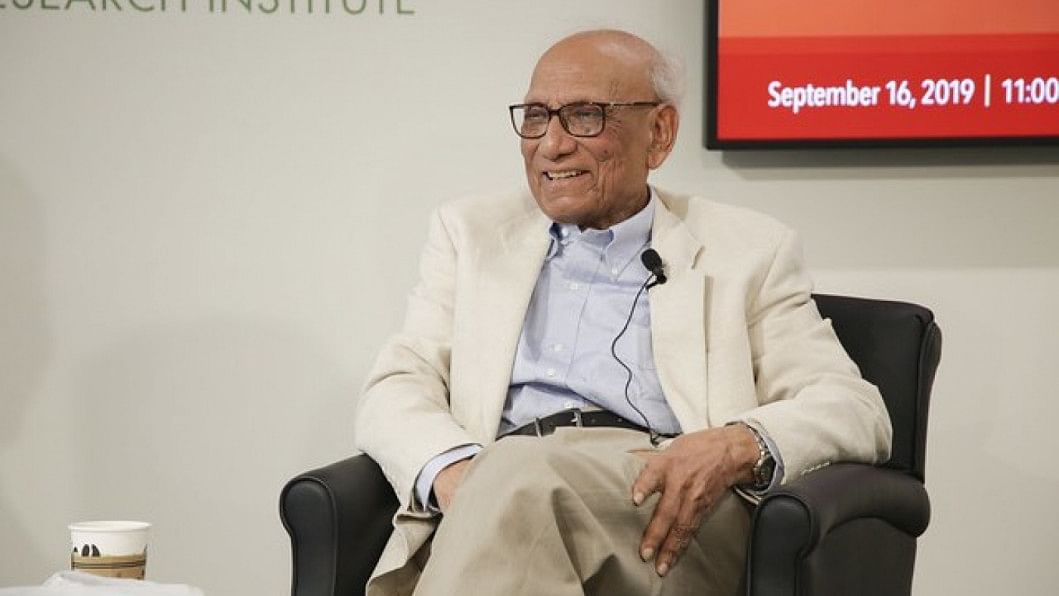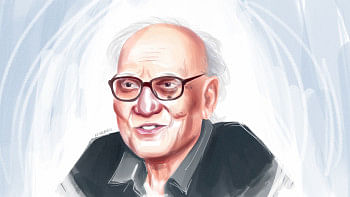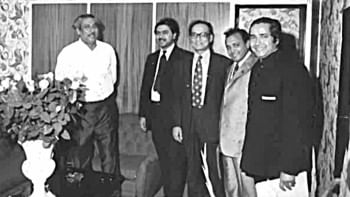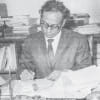Nurul Islam: Celebrating the life of a freedom fighter

The economist
It has been my privilege to have known Nurul Islam over a span of 58 years, as a friend, colleague, and comrade in the struggle for building an independent Bangladesh. While such a long and intimate association has provided me with some unique insights into the man and his work, it obviously does not lend itself to any objectivity in preparing such an appreciation. I will, therefore, as far as possible, let the facts tell the story.
I met Nurul Islam for the first time in October 1957, at the Economics Department of Dhaka University. I had just joined the department as a senior lecturer. I had heard through the grapevine that Nurul was the bright star of the department. He had returned a year ago with a PhD from Harvard University, where his records had been among the best in a class from which a number of his classmates eventually rose to positions of eminence in the academic world or working for the government. On his return, he had, on the strength of his outstanding academic records, been appointed a reader in the Economics Department.
I discovered that Nurul not only had a deep understanding of the discipline, but an incisive mind projected through a rather sardonic worldview. Since Nurul spent much of his spare time doing research in the library, an area less frequented by his colleagues, he was not in great social demand. He, thus, found in me a willing acolyte with whom he could not only share his erudition, but also his own concerns at the inadequate appreciation of academic excellence.
Nurul was elevated to a professorship in 1960 and eventually took over as chair of the Economics Department in 1963, when Prof Huda departed for Karachi to serve as a member of the Planning Commission. In the first half of the 1960s, we were both involved in debates highlighting the disparities between East and West Pakistan and the identification of policies and institutions needed to address this divide. The ideas generated from our work contributed to the preparation of the Six-Point Programme presented to the people by Bangabandhu Sheikh Mujibur Rahman, which became the magna carta for self-rule for the Bangalees.
Nurul's most significant contribution to economics in then Pakistan came from his tenure as the first Pakistani director of the Pakistan Institute of Development Economics (PIDE). Nurul maintained and added value to PIDE's growth as an institution of excellence. He not only provided leadership to the group of expatriate economists who continued to provide the professional base for leading PIDE's research agenda, but also inspired a further generation of young Pakistani economists. He was particularly effective in bringing over to PIDE a younger generation of more talented Bangalee economists. Under Nurul's leadership, this group of Bangalees at PIDE constituted a veritable think tank of policy ideas which fed the agendas for self-rule for East Pakistan and incubated further policy options for the germinating state of Bangladesh.
Nurul's unique quality as a professional economist originated in the common sense and pragmatism which influenced his great faith in empirical work. Unlike some of us who tend to be influenced by our own particular ideological baggage when we advocate policy, Nurul put greater faith in letting the evidence influence the ideology and even shape theory. He did, however, contest theory which was not sustained by evidence and challenged policies founded on insufficient empirical work. Such an approach may have kept his research work out of the more exclusive economic journals and made him a less influential policymaker, but it made him an outstanding commentator on received academic wisdom and a critic of half-baked policies.
The freedom fighter
The one area where Nurul tended to subordinate his belief in the primacy of empiricism was in his commitment to the idea of Bangalee nationalism driven by his visceral hostility to the hegemony of Pakistani rulers. His antipathies influenced his research priorities, which focused on aspects of the national policy that widened and perpetuated disparities between East and West Pakistan. Such a politically oriented research perspective encouraged Nurul to guide younger Bangalee researchers as well as some of the expatriate economists at PIDE to channel some of their research towards diagnosing the dynamics of the East-West divide.
Nurul's own less flamboyant personality discouraged him from flaunting his antagonisms towards Pakistan's policymakers in public, but did not inhibit him from sharply articulating his views in more academic fora. Nor did his strong views diminish the quality of his academic research, which remained committed to drawing on credible empirical work.
During his tenure at Dhaka University, Nurul played a leading role among the Bangalee economists who drafted the critique of Pakistan's discriminatory economic policies towards East Pakistan at the conference of the Pakistan Economic Association on the First Five-Year Plan, convened in Chittagong at the end of 1956. Nurul and I had also been invited to participate in an extended discussion in Rawalpindi in 1961 on the Second Five-Year, where we had crossed swords with the top economic policymakers of Pakistan in critiquing their neglect of East Pakistan in the plan.
Nurul's writings and views, which remained highly professional in content, further encouraged the government to invite him to serve as a member of the first Finance Commission, where he was again the lead draftsman in preparing the dissenting report presented by the Bangalee members of the commission. It is, thus, a tribute to Nurul's professional recognition as the premier academic economist of Pakistan that he was acceptable to Pakistan's top policymakers to head the PIDE in 1965, when the debate on the deprivation of Bangalees was at high tide.
An enemy of the state
Nurul's move to Dhaka coincided with the elections of December 1970 which, through the overwhelming victory of the Awami League in East Pakistan, definitively transformed Pakistan's political landscape. Within days of his arrival in Dhaka, Nurul, Kamal Hossain, Anisur Rahman, Professor Muzaffar Ahmed Chowdhury, Professor Sarwar Murshid and myself were called in by Bangabandhu to give shape to the operationalisation of Six Points within the AL's constitutional draft and its incorporation into their final negotiating position at the forthcoming meeting of the newly elected constituent assembly.
We spent long days sequestered in a house on the banks of the Buriganga, engaged in intensive discussions with Bangabandhu and Tajuddin on the constitution. By that time, Nurul's fate, even if he may not have been fully aware of it, had been inextricably linked to the fate of Bangabandhu and the future of the emergent state of Bangladesh.
During the birth of an independent Bangladesh in March 1971, when Bangalees attained self-rule under the leadership of Bangabandhu for the first time since the Battle of Plassey in 1757, Nurul's home in Dhanmondi became a small outpost for the virtual government of independent Bangladesh, with its headquarters located at Bangabandhu's residence, and its branch office at the residence of Kamal Hossain. Nurul Islam's residence became a meeting place of the economic team who met with officials and business groups to discuss and resolve emergency problems such as the emerging shortage of currency notes in the banks or problems of delivering fertiliser to farmers during a period of total government shutdown.
We academic economists had our first exposure to addressing real-life problems in real time, rather than through writing papers. Our recommendations were passed upwards for Bangabandhu's approval and then passed on by Kamal and Tajuddin to a liaison group of senior bureaucrats for implementation.
After the departure of Tajuddin, one of the few people whom Bangabandhu implicitly trusted, Nurul was his first choice to take over as finance minister.
In the last days, prior to the launch of the genocide on Bangalees by the Pakistan Army, Nurul, Anisur Rahman, and myself were involved in backstopping the Awami League team of Tajuddin Ahmad, Syed Nazrul Islam, and Kamal Hossain in their ongoing negotiations with a Pakistani team involving General Peerzada, MM Ahmed, and ex-Chief Justice Cornelius to reach a settlement to avert the final crisis. The negotiations were, of course, a deliberately duplicitous exercise initiated by Yahya Khan while they prepared for a military crackdown. When Operation Searchlight was launched by the Pakistan Army, the economists were still at their respective homes. Fortunately, I had been persuaded by our mutual friend, Muyeedul Hasan, on the morning of March 27, that I should leave my home as the army may be after me. This advice was providential since a posse from the army did come to my home in Gulshan to arrest me on the afternoon of March 27.
I had not, till then, appreciated that in the eyes of the Pakistan military I had been elevated from the ranks of a political economist to an active participant in a war of national liberation. Nurul Islam, fortunately for him, continued to be categorised as an economist and could still attend the PIDE office in Motijheel for a few days when curfew was lifted on March 27. But once I had been targeted, there was every likelihood that his role, in the critical months of March, would place him within the gun sights of the army. So our friend Muyeedul Hasan who had, along with Mukhlesur Rahman, another friend, organised the exit of myself and Anisur Rahman across the border into India at the end of March, arranged for Nurul to cross the border a few weeks later. In Narsingdi, en route to the border, Nurul may probably have established himself as the only Harvard PhD to have been exposed to strafing by US-provided F-86 Sabre jets of the Pakistan Air Force. He eventually met up with Anisur Rahman and myself at the residence of Dr Ashok Mitra, then economic adviser to Indira Gandhi, whose Delhi home in Lodhi Gardens emerged as a sort of refugee camp for senior Bangalee economists.
Nurul managed to get across to the US where he was provided with an academic billet at Yale University, while Anis was similarly accommodated at Williams College. While I, too, had been offered an academic position at Queen Elizabeth House, Oxford, my more substantive role throughout 1971 was to travel across Europe and North America as the envoy of the Mujibnagar government with the task of stopping aid to Pakistan. In this campaign, Nurul and Anis made their contributions through reaching out to the US academic community. At one stage, Nurul joined me in Washington DC, around the end of October 1971 during the annual meeting of the IMF, World Bank where, along with AMA Muhith, we met various delegates from donor countries to argue for the stoppage of aid for Pakistan and for recognising the independence of Bangladesh.
Planning for a new nation
As Bangladesh's liberation became imminent, Nurul faced a critical life choice. He had been offered a senior position as director of research at the World Bank, which could put him back on his original career path of development research, from where he could have eventually been elevated to even more senior positions. But his competing tension of serving Bangladesh brought him back to a still unsettled Dhaka, after the liberation of Bangladesh on December 16, 1971, where I met up with him following my return home on December 31, 1971. Nurul and I met Bangabandhu, within a day of his return to Dhaka on January 10, 1972, who had no hesitation in inviting Nurul to take on the challenging task of deputy chairman of the yet to be established Planning Commission. He also asked Anisur Rahman and myself to become members and agreed to our request that Mosharaff Hossain, who had played the lead role in establishing the Planning Cell in the Mujibnagar government, should join us as a member.
Nurul has written his own accounts of how we responded to the challenge of setting up a national planning agency in a newly created, resource-less, war-devastated nation. The real challenge for Nurul was to effect a transition from what had, till then, been an exclusively academic life, to take on the far more challenging task of designing economic policies and making decisions which impacted the lives of real people and had direct political consequences.
The Planning Commission, in its conception and design, was believed to be the fountainhead of economic decision-making. But as we discovered from experience, designing policies and having these approved by the cabinet was a complex political task. Even approved policies remained a long way removed from ensuring the outcomes which were supposed to flow from these policies. The implementation of policy depended largely on the ministries and their interface with the complex political economy which influenced their respective spheres of action.
The senior bureaucrats who were entrusted with operationalising policies at the ministerial level were far from cooperative with the professionals at the Planning Commission. Many of the secretary-level bureaucrats were senior to Nurul and his members in years and experience, particularly in the practice of governance. They had come of age in the governance culture of the Ayub raj, where the CSP was king, the minister was his public relations officer and the technocrat was the workhorse of the department. A new order, where ministers were politically empowered, and did not need to depend on policy guidance from their secretaries since they had access to alternative advice from the technocrats in the Planning Commission, who had acquired their own political credentials through engagement in the liberation struggle, was a rather traumatic experience for senior bureaucrats. In this fraught environment, Nurul not only had to establish an entire planning apparatus from ground zero, but he had to navigate the process and operationalise the commission through these treacherous shoals in the murky waters of a still evolving process of governance.
Since the Planning Commission had, inter alia, been entrusted with the responsibility of aid negotiations, Nurul had to also deal with aid donors who had once lorded it over an accommodating Pakistani state. It should be kept in mind that in the 24 years of Pakistani rule, no Bangalee, whether at the ministerial or official level, had any exposure to aid negotiations. Had the commission simply taken its cue from MM Ahmed and the Pakistan Planning Commission, we could have rolled over on our backs and re-established the hegemonic influence of the World Bank who would have happily intermediated our aid relations with the rest of the donor community.
But all of us were, at that stage, young enough to be intoxicated with the notion that a nation which had emerged out of a protracted struggle, through blood and fire, should take charge of its own affairs. Tajuddin Ahmed, the first planning minister and chairman of the Planning Commission, strongly believed in protecting our independence from external influences. However, our self-belief would have amounted to little had Bangabandhu not invested his own authority behind us in setting up the commission and establishing an independent position in our relations with the donor community.
The positives of the challenge are part of the historic record. Nurul, ably backed by the secretary of the Planning Commission and External Resource Division, Syeduzzaman, negotiated over a billion dollars of assistance, which were allocated among politically powerful and resource-hungry ministries, each with their retinue of political intermediaries. It is notable that during the three years of Nurul's tenure as deputy chairman, not a single charge of corruption or malfeasant conduct could be attributed to the Planning Commission. Such a record would be hard to imagine today. The commission itself was set up from scratch with a recruitment, exclusively made on merit, of over 300 of the best professionals in the country. Again, not a single appointment was made on political consideration or under political pressure, even though such pressures from newly empowered political players was enormous. Here again, the protection provided to the commission by Bangabandhu was critical in the independent exercise of Nurul's responsibilities both in setting up the commission and dealing with the external world.
Finally, within a period of 12 months, between August 1972 and September 1973, the Planning Commission presented Bangabandhu with Bangladesh's First Five-Year Plan, prepared exclusively by the professional staff of the commission, without resorting to foreign consultants or genuflection to external donors. The document itself was overtaken by the fallout of the global economic crisis and the unfolding political events which culminated in the assassination of Bangabandhu with its consequential regime change. But as a statement of a newly independent regime, committed to build a more equitable society, the first plan deserves to be re-read as a testimony to a now bygone age, which, in my view, still stands the test of time. Mosharraf Hossain, ably supported by Syeduzzaman, played a seminal role in putting this document together. But Nurul as deputy chairman, with the massive professional effort of AR Khan and his colleagues in the General Economic Division, designed the macro-economic framework of the plan and skilfully integrated this with the sectoral components of the plan.
Once the first plan was approved by the cabinet in November 1973, Mosharraf and Anis returned to academic life and I followed them in September 1974. Nurul arranged his own exit through a fellowship at Nuffield College, Oxford, but this was a more complex task since Bangabandhu was, among all of us, the most disinclined to let him depart. He had extraordinary faith in Nurul because of his integrity and loyalty. But the quality he perhaps most appreciated was Nurul's pragmatic approach to policy advice and his willingness to speak truth to power. In a milieu where political passions, pre-set philosophical positions or personal interests tended to influence policy advice, Nurul Islam's objective, unmotivated advice was particularly appreciated by Bangabandhu.
After the departure of Tajuddin, one of the few people whom Bangabandhu implicitly trusted, Nurul was his first choice to take over as finance minister. But the unresolved tensions within himself had persuaded Nurul that he should, for the moment, return to academic life. Such was Bangabandhu's faith and generosity towards Nurul that he insisted that Nurul go to Oxford on a year's leave of absence and then return as his finance minister. The assassin's bullets eventually resolved this tension for Nurul and set the seal on his lifetime self-exile from Bangladesh.
Summing up
At the end of these years, the contradictions inherent in the worldview and lifestyles of academics who had strayed into the real world of politics caught up with all of us, but particularly with Nurul, who was the most academically oriented among us. By training, inclination and temperament, Nurul was destined to be a professor of economics at Harvard University. But he had also aspired to shape policy and contribute to forging the destiny of Bangladesh, a largely political task for which we and Nurul, in particular, were ill-suited. We were not just content to be bureaucrats and technocrats serving political masters. We genuinely sought to change the world in which we grew up and to help in shaping a newer, better, world. But this was not a task which could be carried through by academics with a casual involvement in the political process. As, at the climax of Bangladesh's liberation struggle in 1971, we would have had to fully commit ourselves to a political life with all the risks and inconveniences involved. Among us, possibly only Mosharraf Hossain was suited to this task and missed his true vocation by returning to the academic world at the end of 1973.
Nurul Islam, the best of the economists among us, found himself caught between his two conflicting dreams. Nurul today is recognised, with respect, in the profession of economists. He did commendable work as the assistant director-general of FAO and then at IFPRI. But these engagements were hardly the summation of his real worth as an economist. Nurul could have been in contention for a Nobel Prize in economics or he should have ended his career as the transformative economic czar of an economically vibrant Bangladesh. This tension could never be satisfactorily resolved through a conspiracy of circumstances as much as the contradictions within himself which committed him to two inherently irreconcilable dreams.
This is an abridged version of a tribute to Prof Nurul Islam from 2015.
Prof Rehman Sobhan is chairman of the Centre for Policy Dialogue (CPD).

 For all latest news, follow The Daily Star's Google News channel.
For all latest news, follow The Daily Star's Google News channel. 







Comments